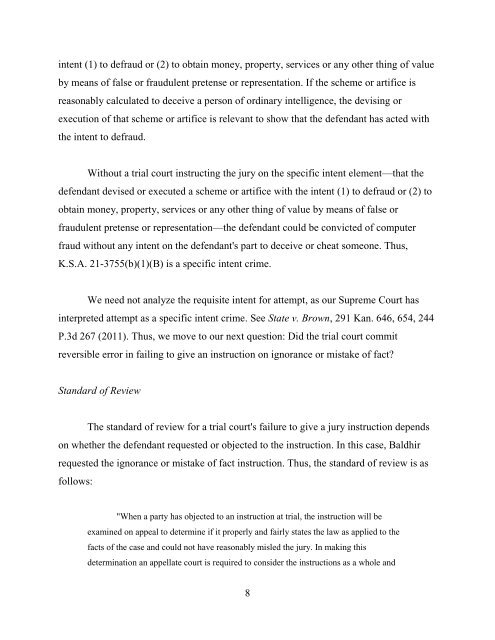Kansas Court of Appeals - 105930 â State v. Sood
Kansas Court of Appeals - 105930 â State v. Sood
Kansas Court of Appeals - 105930 â State v. Sood
You also want an ePaper? Increase the reach of your titles
YUMPU automatically turns print PDFs into web optimized ePapers that Google loves.
intent (1) to defraud or (2) to obtain money, property, services or any other thing <strong>of</strong> value<br />
by means <strong>of</strong> false or fraudulent pretense or representation. If the scheme or artifice is<br />
reasonably calculated to deceive a person <strong>of</strong> ordinary intelligence, the devising or<br />
execution <strong>of</strong> that scheme or artifice is relevant to show that the defendant has acted with<br />
the intent to defraud.<br />
Without a trial court instructing the jury on the specific intent element—that the<br />
defendant devised or executed a scheme or artifice with the intent (1) to defraud or (2) to<br />
obtain money, property, services or any other thing <strong>of</strong> value by means <strong>of</strong> false or<br />
fraudulent pretense or representation—the defendant could be convicted <strong>of</strong> computer<br />
fraud without any intent on the defendant's part to deceive or cheat someone. Thus,<br />
K.S.A. 21-3755(b)(1)(B) is a specific intent crime.<br />
We need not analyze the requisite intent for attempt, as our Supreme <strong>Court</strong> has<br />
interpreted attempt as a specific intent crime. See <strong>State</strong> v. Brown, 291 Kan. 646, 654, 244<br />
P.3d 267 (2011). Thus, we move to our next question: Did the trial court commit<br />
reversible error in failing to give an instruction on ignorance or mistake <strong>of</strong> fact?<br />
Standard <strong>of</strong> Review<br />
The standard <strong>of</strong> review for a trial court's failure to give a jury instruction depends<br />
on whether the defendant requested or objected to the instruction. In this case, Baldhir<br />
requested the ignorance or mistake <strong>of</strong> fact instruction. Thus, the standard <strong>of</strong> review is as<br />
follows:<br />
"When a party has objected to an instruction at trial, the instruction will be<br />
examined on appeal to determine if it properly and fairly states the law as applied to the<br />
facts <strong>of</strong> the case and could not have reasonably misled the jury. In making this<br />
determination an appellate court is required to consider the instructions as a whole and<br />
8

















